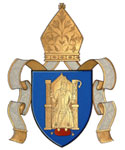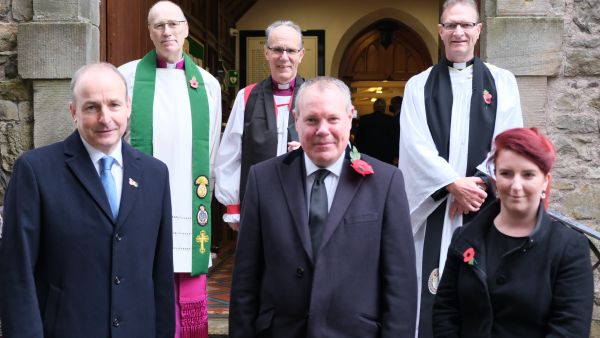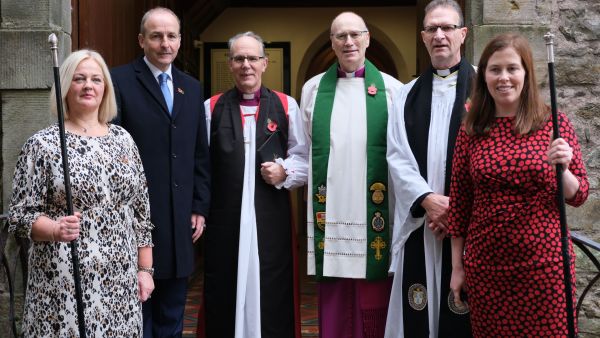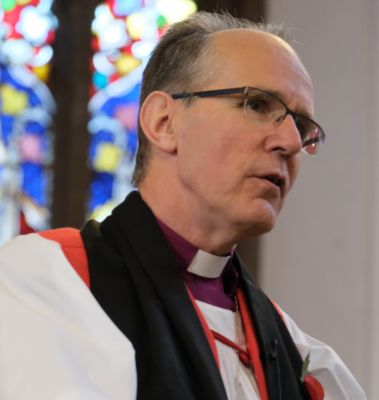 |
 |
News
Government representatives attend Remembrance Service in Enniskillen

At St. Macartin's Cathedral on Remembrance Sunday.
The main Remembrance Service in Clogher Diocese was held in St Macartin’s Cathedral, Enniskillen at 11.30am on Sunday, 14th November, following the wreath-laying ceremony held at the Cenotaph in Belmore Street.
The service was conducted by the Dean of Clogher, the Very Revd Kenneth Hall and the Bishop of Clogher, the Right Revd Dr. Ian Ellis was the preacher.
Monsignor Peter O’Reilly of St. Michael’s Roman Catholic Church led the prayers.
The readings were by Mr John Jones, Chairman of the Enniskillen Branch of the Royal British Legion; Viscount Brookeborough, Her Majesty’s Lieutenant for Fermanagh and Mr. Scott Elliott, Parish Reader.

Attending the Remembrance Service
Among the guests attending were Minister of State, Mr Conor Burns M.P.; the Taoiseach, Mr. Micheál Martin T.D.; the US Consulate General representative, Mr Chris Rendo; the Honorary Consul of Poland, Mr Jerome Mullen; the NI Executive representative, Ms Michele McIlveen, Minister of Education; the Shadow Secretary of State for NI, Ms Louise Haigh M.P. and Mrs Arlene Foster, former First Minister.
During the Act of Remembrance, a page in the Book of Remembrance was turned by Lt. Col Mark Scott (Ret’d) MBE, DL Royal Inniskilling Fusiliers, who also led the exhortation. The Last Post and Reveille were sounded by Mr Warren Kerr, of Ballyreagh Silver Band and a Piper’s Lament was played by Pipe Major Gordon McKeown, 4 UDR Association.
The hymns were; “Praise my soul, the King of heaven;” “I vow to thee, my country,” “Lord, while for all the world we pray,” “Your kingdom come, O God” and “Be thou my vision.” The organist was Mr. Glenn Moore.

Bishop Ian Ellis.
In his sermon, the Bishop of Clogher spoke of the service to others.
The full text of Bishop Ellis’s address is as follows;
‘No one has greater than this, to down one's life for one’s friends’ John 15 v 13.
Today we have focused our thoughts on those who gave their lives in defence of freedom in service to their country. We have quite rightly remembered those killed in the First and Second World Wars, the thousands of young men killed at the Somme, the Second World War in Europe fought on so many fronts, in the air on land and sea. Modern television documentaries have graphically illustrated the horrors of these wars, the miscalculations, the errors of judgement of generals and the needless slaughter.
We remember other conflicts too, the war against the Japanese and the North African campaign. In our own time we reflect upon the Falklands War and the Gulf War and the wars in the Balkans, Iraq and Afghanistan.
In Northern Ireland we also recall those who lost their lives as a consequence of the troubles. Remembrance Sunday is also a poignant reminder of the devastating 1987 bomb at Enniskillen War Memorial and we recollect with great sadness the 12 individuals from this town who were killed that day - we think also of many who have carried forward scars and trauma from violence- and the bereaved who continue to bear the loss of loved ones. We reflect once again on the plight of victims and survivors and their search for answers to so many questions and who yearn for justice - we ask again that our political leaders urgently address this unresolved legacy of our troubles.
This year also marks the 100th anniversary of the founding of the Royal British Legion and we remember with pride their work today. Their continuing role is for the welfare and support of the survivors and widows and their dependants. They are a group responding to the command of Christ to love one another as I have loved you. They are following the injunction of Saint James who puts bluntly the obligation on all followers of Christ, religion that is pure and undefiled before God the father is this: to care for orphans and widows in their distress.
The Legion also have a custom at gravesides still today of gathering and standing to attention remembering a comrade who is died and someone will say the poignant words of remembrance, they shall grow not old as we that are left grow old.
Remembrance is most valuable when it centres on an individual, an actual soldier, sailor or airman who lived among us and belonged to a family and was loved and had hopes of better things. Today's an occasion to recall particular people so that they will briefly be alive again in our memory. And we also have a duty to help our children imagine in their minds what war and conflict might have been like and to learn how to live in peace.
This Cathedral has an historic link with the former Portora Royal School which has recently been amalgamated with Enniskillen Collegiate to become a new school, Enniskillen Royal Grammar School. A former Deputy Principal of Portora, Robert Northridge has, just a few years ago published a book tracing the contribution of pupils of Portora in the Second World War - it's a fascinating collection of statistics and stories of service of young men many who were just boys. The author notes that 456 young men from Portora went to war to serve the cause of freedom. Because it was a boarding school the boys came from 30 of the 32 counties in Ireland. Of the 456 who left Ireland, 50 were to die as a result of conflict.
There's also an interesting fact about the school’s senior rugby teams during the Second World War - from the 1938 - 39 rugby team 18 of the 22 who played went to war, from the 1939-40 team 18 of the 23 went to war and from the 1940 - 41 team 22 went to war. We can just imagine the peer pressure to join up within a closely knit group. The figures illustrate how great was the sense of service and our indebtedness to these young men for the willingness to give that service for the freedom of others.
This morning I want to focus on that word service - while it is correct that we think of those who died it is easy to forget the majority of servicemen and women who survived the wars, and who did return and we pay a tribute today to their service. Almost every parish church and every town and village has not only a memorial to the dead but often a tablet to those who served. Reading through those names tells a story of young men and women who gave their best and stood on our behalf where we could not stand. They responded to the call of country to enlist and head out to war not knowing if they would ever return to their families.
They joined up because they wanted to serve, ‘your country needs you’, they were told. They headed out of villages and towns such as ours to the cities and ports to catch trains and ships to carry them off for military training and then to the front often within a matter of weeks. Boys became men in a very short space of time.
Today remember their service, their devotion to duty, their bravery and dedication. And we also remember that they brought home something, their memories of the horrors of battle. They may have survived but they had to carry with them experiences which they perhaps never shared, long before post-traumatic stress was understood. Today we give thanks for those who served for us their friends.
There were others who served the war effort who were not soldiers but their work was vital, the farmers and factory workers and civil servants whose efforts fed the nation and supplied the services this country with what was needed to fight to defend freedom - their contribution of service was just as vital yet it seemed to receive little credit.
I came across an interesting illustration of this, during the dark days of World War Two. England had a great deal of difficulty keeping men in the coal mines. It was a thankless kind of job lacking in any glory - most men choose to join the military so something was needed to motivate these men who were working in the mines.
With this in mind Winston Churchill delivered a speech one day to thousands of coal miners stressing the importance of their work for the war effort. He told him to picture the grand parade on VE Day. First, he said would come the sailors of the British Navy who appealed to the great tradition of Trafalgar, next the pilots of the Royal Air Force who saved Britain from the dreaded Luftwaffe, next the army who stood at the crisis of Dunkirk. Last of all he said would come a long line of sweat stained soot-streaked men in miners’ clothes. And someone he said would cry from the crowd, and where were you during the critical days struggle, and then from 10,000 throat's would come these words, we were deep in the earth with our faces in the coal. And we're told but there were tears in the eyes of many of the miners who heard those words that day. They had been given a sense of their own self-worth by the Prime Minister.
The point is the service does not always come with medals and ribbons and that is forever true - it is often the humble acts of service that provide us with a deeper sense of joy at the most fulfilling satisfaction. Whether it's in war or church or community life it is quiet acts of faithful service which sustain us and are vital for the ongoing life of our society. We are all called today to serve our community and our country using the gifts and skills that God has given us whether in the workplace, the council chamber, the legislatures of our lands - our call is to serve one another and to seek the common good. To seek peace and community reconciliation and a path to a better future. That is our call to service today.
Jesus said no one has greater love than this to lay down one's life for once friends. Today, we have paused to reflect on all who have served our country and community - Those who never returned but gave their lives for the freedom of their friends, we thought too of those who did return and those whom we have known in our own time who lost their lives in the troubles of our own country. We find inspiration in that quality of service to others in a multitude of unseen yet highly significant ways to maintain and develop our society.
We take our lead from the pattern of service of our master Jesus Christ, the one who said these words and who just a short time later gave his life on a cross as the perfect sacrifice for the sins of the world. And we are called to a life of service to Christ and to our country and the world. May we not be found wanting when the judge of all comes and may we receive that commendation reserved for those who love and serve him, well done thou good and faithful servant.